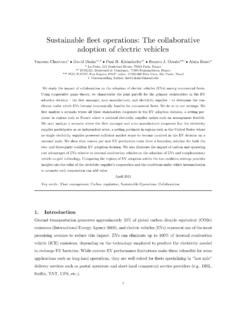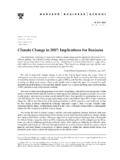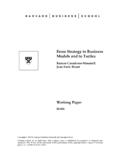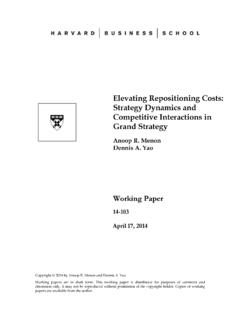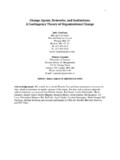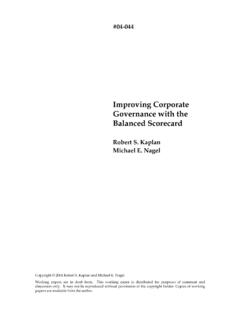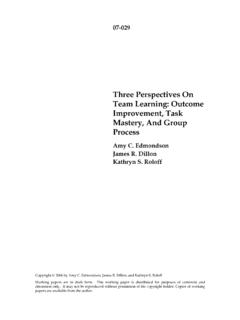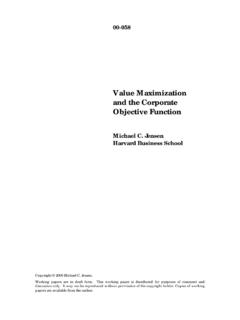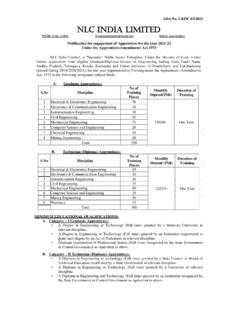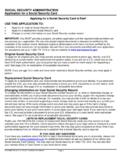Transcription of Management: Theory and Practice, and Cases
1 Copyright 2013 by Richard L. Nolan Working papers are in draft form. This working paper is distributed for purposes of comment and discussion only. It may not be reproduced without permission of the copyright holder. Copies of working papers are available from the author. Management: Theory and Practice, and Cases Richard L. Nolan Working Paper 14-026 September 11, 2013 Management: Theory and Practice, and Cases Richard L. Nolan Abstract This working paper reports on a major Harvard Business School project designed to enhance MBA and practicing executives in case learning.
2 The work is built on the foundation of HBS field Cases employing the monomyth hero s journey classic story structure along with the creation of associated fictional case characters designed to engage readers in the dimensions of human behavior, decision making, and judgments in carrying out the work of the modern corporation. A most fortuitous event in starting the project was the engagement of our research assistant with a theater academic background, and experience as a scriptwriter and director at a repertory theater.
3 Shannon O Connell noted that our collection of field Cases on learning to become a successful functional manager had the potential to be organized into an executive s hero s journey. This setoff a process: (1) completing our field Cases to encompass the issue domain of an IT functional manager; (2) recrafting the Cases from multiple industries to include one industry; (3) integrating the key characters of monomyth hero s journey, and (4) writing the case dialogue for the protagonist s, Jim Barton, hero s journey. The result was our novel based Harvard Business Press book: Adventures of an IT Leader (2009).
4 In our Adventures book, we experimented with mechanisms to facilitate active learning such as Jim Barton s living whiteboard, whereby Barton kept a running list of ideas associated with a set of evolving principles of IT management. Another mechanism we used to facilitate reader/student introspection was end of chapter/ Cases Reflections. Also, we experimented with audio versions of book chapters in the classroom. We went onto continue Jim Barton s hero s journey in a second Harvard Business Press book using the same novel format, but a different industry and executive context: Harder Than I Thought: Adventures of a twenty first century leader (2013).
5 Harder focuses on CEO leadership in the global economy and the fast changing IT enabled pace of business. We extended the mechanism of Barton s living white board to interludes in the book of simulations and avatars to explore CEO decision making. Keywords: Cases , innovation, management, CIO, CEO, hero s journey, monomyth 1 Management: Theory and Practice, and Cases Richard L. Nolan Dartmouth s Amos Tuck was established in 1900 as the first graduate school of management. The Harvard Business School was established in 1908 and awarded the first MBA (Master of Business Administration).
6 While Tuck was the first graduate school of management, the Harvard Business School is noted and famous for being the business school that pioneered the case method arguably, the dominant methodology for training management professionals. The founders of the Harvard Business School concluded post- graduate study of management had similarities to other professional schools like Medical and Law Schools. This similarity in learning from practice is reflected in the footnote of every Harvard Business School case: Cases are not intended to serve as endorsements, sources of primary data, or illustrations of effective or ineffective management.
7 This footnote cautions that similar to other professions like medicine and the law, there are rarely pat answers to complex decisions in the disciplines of continuously changing fields and those that are imbued in highly complex human situations. Experience and judgment are always in play, and relevant in many ways. Teaching Cases are intended to focus on important issues in the purview of practicing managers, and as a basis for discussing these issues in context, determining alternative courses of actions for analyzing and deciding on these issues, and facilitating a process of contemplation by the student in creating his/her knowledge necessary to operate as an effective management leader.
8 The MBA degree is intended to certify that a graduate has engaged in an intensive process of mastering a process of study that 2embodies analyzing the key set of management issues of practicing executives and techniques for executing alternative courses of actions for addressing the issues. As important, case study is intended to communicate and provide incentive to aspiring managers to maintain a process of reflection on their decisions in practices and a drive towards continuous learning. This continuous learning is facilitated by activities at HBS including publishing teaching Cases and the Harvard Business School Review, providing global Executive Education programs, and hosting research conferences on important business subjects such as causes of the Financial Crisis of 2008.
9 While Cases persist in the curricula of virtually every business school, Cases and the case method as developed and used at the Harvard Business School are not without controversy. The controversy is especially apparent in major research universities with business schools. I studied management at a research university whereby the traditional arts and sciences faculties exerted strong influence and control in the university and faculty promotion processes. Faculty promotions were submitted to the President and a senior university faculty committee (without senior business school faculty members) for final review.
10 In the final oversight review, published articles in what are called first-tier academic journals 1 were heavily weighted in the final tenured promotion decisions. Cases and case teaching were given secondary consideration, if any consideration at all. Accordingly, I like many management students, had mixed exposure to Cases during my business school studies. And what exposures I did have with Cases in the classroom were more lectures about the case than class discussion of the case issues. 1 First tier journals were heavily biased towards established academic fields such as Administrative Science Quarterly for business school faculty specializing in organizational behavior, or Communications of the ACM for business school faculty members specializing in IT strategy and management.
